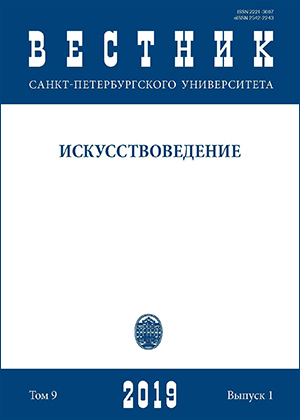Giuseppe Sarti and the topos of the tragic in Russian music
DOI:
https://doi.org/10.21638/spbu15.2019.101Аннотация
Praising Glinka’s A Life for the Tzar as an inauguration of Russian music, Vladimir Odoevskii emphasized that its composer succeeded in elevating the figure of a simple peasant to the realm of tragedy. Odoevskii’s claim thus embodied the plea for the manifestation of tragedy based on a nationally-driven socially and culturally significant idea, conveyed through a sublime mood. Adopting this domain was indeed a long journey for music in Russia. The present essay traces forerunners and emerging elements of tragedy and its musical implementation back to the last decade of the eighteenth and the beginning of the nineteenth centuries, with an emphasis on Giuseppe Sarti’s (1729–1802) impact on the adoption of the tragic and the sublime in Russian music. A survey of Sarti’s stage works for the 1780–90s reveals his preferred pattern of conveying a sublime atmosphere of classicistic tragedy through unmeasured text and declamation — whether notated or not — located in the cathartic points of the drama, in conjunction with unison chorus and illustrative elements in the orchestra. Sarti’s contribution to the marriage of European neo-classicism with local trends and the domestication of tragedy in Russian music is demonstrated through a survey of declamation in recitatives and melodrama styles in works by Evstignei Fomin, Stepan Davydov, Stepan Degtiarev, and Osip Kozlovskii.
Ключевые слова:
Eighteenth-century music, music and dramatic theater in Russia, Giuseppe Sarti, Evstignei Fomin, Stepan Davydov, Osip Kozlovskii, tragedy, melodrama, recitative
Скачивания
Библиографические ссылки
Sources
Parma: Stamperia Reale, 1782.
S Pietro a Majella (I-Nc), XXXI. 3.16.
XVII. Fomin, Evstignei. Orfei. Score, edited by B. Dobrokhotov. Moscow: Muzgiz, 1953.
XVIII. Kniazhnin, Iakov. Sobranie sochinenii. St. Petersburg: Tipografiia Gornago uchilishcha, 1787, vol. 2.
XIX. Sarti, Giuseppe. Castore e Polluce. Dramma per musica in 5 acts. Libretto Ferdinando Moretti. St. Petersburg: Imperial Press, 1798.
XX. Sarti, Giuseppe. Castore e Polluce. Score: St. Petersburg: Rossiiskii Institut Istorii Iskusstv (RUSSpit) F. 2. Ed. 1. File 754.
XXI. Davydov, Stepan. Rusalka. Part 3. Piano-vocal score, nos. 1–17. St. Petersburg: P. Plavilshchikov, 1807. (In Russian)
XXII. Davydov, Stepan. Lesta, Dneprovskaya rusalka (excerpts). Istoriia Rysskoi muzyki v notnykh obraztsakh, edited by S. Ginzburg, 32–77. 2nd ed. Moscow: Muzyka, 1969, vol. 2. (In Russian)
XXIII. Degtiarev, Stepan. Minin i Pozharskii ili Osvobozhdenie Moskvy. Score. Moscow: Deka-BC, 2006. (In Russian)
XXIV. Martín (y Soler), Vicente. Didon abandonée. Ballet tragique en cinq actes, De la composition de Mr. Le-Picq, représenté par le Théatre Impérial de St. Petersbourg en 1792, mis en musique par M. Martin, Maitre de Chapelle au service de Sa Majesté Impériale, et dédié à son excellence Mr. le Prince Yousoupoff. St. Petersburg: Breitkopf, 1792.
XXV. Ozerov, Vladislav. Fingal, tragédie en trois actes, traduite du Russe, en vers Français. par H. re J. Dalmas. Polnaia muzyka Khorov, Pantomim, Baletov, i Srazhenii Tragedii Fingala, Sochinennaia G. Kozlovskim. [Partton Complette des Choeurs, Balletset Combats de la Tragédie de Fingal, composée par Mr. Kozlowsky]. St. Petersburg: Dalmas, 1808.
XXVI. Kozlovskii, Osip. Orkestrovaia muzyka. Rossiiskii Institut Istorii Iskusstv, edited by Iurii Keldysh. Moscow: Cortran, 1997, pt. 11. (In Russian)
XXVII. Kozlovskii, Osip. Overture, entre’acte and choruses for the tragedy Esther. St. Petersburg: Rossiiskii Institut Istorii Iskusstv (RUS-Spit), Manuscript department, F. 2-1 No. 33.
XXVIII. Verstovskii, Aleksandr. Askol’dova mogila, Romanticheskaia opera v 6 kartinakh, edited by Maria Shcherbakova. Leningrad: Muzyka, 1983. (In Russian)
Загрузки
Опубликован
Как цитировать
Выпуск
Раздел
Лицензия
Статьи журнала «Вестник Санкт-Петербургского университета. Искусствоведение» находятся в открытом доступе и распространяются в соответствии с условиями Лицензионного Договора с Санкт-Петербургским государственным университетом, который бесплатно предоставляет авторам неограниченное распространение и самостоятельное архивирование.






